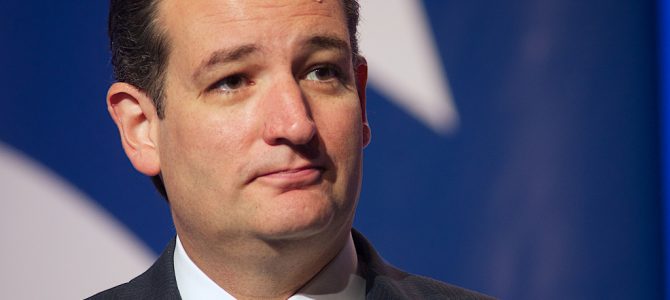
Ted Cruz’s endorsement of Donald Trump struck a ringing blow for the cause of small government—by reminded us to never, ever, ever, ever, ever trust in the integrity or wisdom of a politician.
It was a spectacularly bad decision, both morally and prudentially. And I think Cruz knows it, because he posted it to his Facebook page at 3:24 on a Friday afternoon—what is traditionally known as the time for a “news dump.”
The idea is to reveal something at the end of the working day before a weekend, when all the reporters have already filed their stories and are headed back home and none of their readers or viewers are in the mood to hear about politics, anyway. In today’s news cycle, when every story gets skeletonized by the piranhas on Twitter within five minutes, I’m not sure that tactic works so well anymore, but it’s worth trying when you’re doing something really embarrassing.
And this really is embarrassing. It’s got to be an excruciating personal humiliation for Cruz because Trump has gone after him in such harsh, personal terms, insulting his wife and in a bizarre episode seeming to implicate Cruz’s father in the Kennedy assassination. But personal humiliation is par for the course for those who choose to back Trump. Just ask Chris Christie. A normal politician would maintain some basic level of civility with his primary opponents, knowing he might need them as strong allies and surrogates later. But the surest sign of Trump’s megalomania is that he allows no strong, dignified personalities around him. There is only him, and lackeys.
More importantly, this destroys Cruz’s distinctive political brand. He has always run by positioning himself as the ultimate “true conservative,” the guy who is more-principled-than-thou. It had the advantage of making a virtue out of his unfriendly relations with fellow senators: if he wasn’t liked, that must be because he refused to compromise his principles to play the Washington game.
This was always a bit of a pose. The rap against Cruz from his colleagues is that his “principled” stands consisted of a lot of grandstanding that never achieved any particular legislative results. If you looked closely you could see that attitude in his campaign, particularly the way he attacked other candidates for their stands on immigration despite having advocated substantially similar positions in the past—and Rand Paul very effectively dinged him on it in the debates.
So it’s no surprise that Cruz emerged as the principled holdout against Trump after the Republican Convention in Cleveland, only to knuckle under now. In describing why he changed his mind, Cruz gave six reasons, focusing mostly on the prospect of Hillary Clinton appointing judges to the Supreme Court. But all of those reasons applied just as well in July as they do today.
It’s clear that the only reason for the change is that Trump has been gaining against Clinton in the polls—and Cruz’s reluctance to endorse Trump has been crushing him with donors. Ironically, Cruz would have looked a lot better endorsing Trump at the convention, in the same way someone like Paul Ryan did. For Ryan, it looked (and still looks) like a reluctant, pro forma stand taken out of loyalty to his party. For Cruz, it ends up looking like an embarrassing climb-down motivated by pure, grasping, pragmatic calculation.
This is not exactly a surprise. Cruz is undoubtedly a very intelligent man, but the last year of campaigning has revealed his tendency to attempt devious bits of political triangulation that are just a little too clever to actually work. Cruz spent the end of 2015, for example, sidling up to Trump and describing him as “terrific,” clearly in an attempt to ingratiate himself with Trump’s voters and win them over to his camp when Trump dropped out. Not only did Trump stay in the race, but he repaid the kindness by hurling insults at Cruz—reinforcing the sense that it’s worse to be an ally of Trump than an enemy.
Then there was Cruz’s big defiant speech in Cleveland where he urged Republicans to “vote your conscience.” The thing that struck me about that speech, however, was that on paper it seemed perfectly calibrated to be ambiguous. The Federalist’s Sean Davis described it as a “Rorschach Test.” When Cruz urged the audience to search their conscience and vote for a candidate “who you trust to defend our freedom and to be faithful to the Constitution,” well, they could have chosen to interpret that to mean Trump.
At the same time, Cruz didn’t explicitly say he would vote for Trump, so it was a clever attempt to have it both ways. If Trump wins the general election and proves popular, people were supposed to remember that speech as an implicit endorsement. If Trump lost and his supporters were swept out of the party in a wave of bitter recriminations, people were supposed to remember that Cruz never really endorsed him. So the candidate of principle was trying to hedge his bets.
It was Trump who called Cruz’s bluff, sending his people to lead a chorus of booing. (The absence of an explicit endorsement was far too subtle to explain the immediate negative reaction of the crowd.) Trump doesn’t tolerate those who refuse to bend their knee to him, so he forced the conflict. The next day, Cruz made a brave show of standing up to Trump and pretending he meant his speech as a show of defiance. But he wasn’t able to maintain it, and in the end he gave in to narrow, opportunistic, political calculations—just like every other politician.
That’s the enduring lesson of the Ted Cruz fiasco. No matter how bold and principled a politician seems, no matter how smart he is, no matter how much he seems ready and eager to fight—at the end of the day, you can’t trust him. You can’t trust his integrity, you can’t trust his courage, you can’t trust his wisdom, and you can’t even trust his prudence or shrewdness, because at some point every politician sees the polls or the donors going against him and panics.
I have summed this up as the First Commandment of the Right: “Place not thy faith in politicians.” (I thought it had nice biblical overtones, and one of my conservative friends pointed out that it’s just an updated version of a line from Psalm 146: “Put not your trust in princes.”)
This means we should stop looking for saviors and strongmen or people who promise us that only they can solve all of our problems. We don’t need better politicians. We need to stop giving them so much power over our lives. That’s what makes the case for small government. Men who aren’t good enough to stick to their principles until the end of an election season aren’t good enough to make the thousands of other decisions about our lives that they presume to make.
It also means that we need to focus less on the narrow choices of an election and more on solving our problems ourselves, through our own efforts at moral reform and political education. Politicians respond to the will of the people. If we want them to be better—or at least to act better—than we need to be better people. And that’s going to be a much longer, more difficult process of reform than most of us realized before this year.
In the meantime, I’m resting my political hopes on the last Never Trump Republican standing, Ben Sasse—and I look forward to discovering how he will disappoint me in 2020.
Follow Robert on Twitter.









